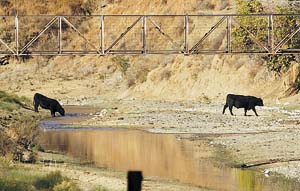One of San Benito County’s most precious resources, agricultural
land, is often passed on from one generation to the next, carrying
with it more than a century worth of history and tradition.
Hollister – One of San Benito County’s most precious resources, agricultural land, is often passed on from one generation to the next, carrying with it more than a century worth of history and tradition.
More than hundred years ago, the Frusetta family settled in South County, the Renz family settled in the East County and the Hawkins family settled in the North County. All three families came to San Benito County for different reasons, but they all continue to work the same land that their forefathers did.
In 1875, the driest year on record, Antonio Frusetta came to San Benito County, one year after it was formed, to purchase a 168-acre parcel of ranch land in Paicines, his 73-year-old grandson Pete Frusetta said.
Agriculture has changed dramatically since then, but the Frusetta Ranch, which is now run by Antonio’s great-grandson Robert, has not been touched by the passage of time. There are good years and bad years and every new generation to take over the ranch has faced unique challenges.
For example, a severe three year drought from 1886 to 1888 forced Antonio to drive his cattle to San Antonio Valley until the rains picked up again in 1889, Pete said. And in 1924, when Antonio’s son George was in control of the land, an outbreak of foot-and-mouth disease, a viral infection that afflicts animals with cloven hooves, devastated the county’s cattle stock.
“It could have been a complete wipeout of the cattle industry here,” Pete said. “It was a great struggle for us without the help of modern medicine.”
Although George was forced to slaughter his cattle, business continued at the Frusetta Ranch and it was passed down to Pete and his brother Pat in 1970.
Even then, some things were easier than they are today, Pete said.
“You never had to deal with lawyers,” he said. “You could make half million dollar deals with a handshake.”
Passing the land down through the generations has not been easy.
“As the heirs get more and more scattered it gets more difficult – there are only a few of the old families left,” Pete said. “I’m happy (the ranch) has remained in the family – we are one of the few.”
The Frusetta Ranch has survived every challenge and continues to be productive today, said Robert Frusetta.
“We’ve gone through fires, floods and droughts and been luck to continue on,” Robert said. “I celebrate the privilege to work on the family ranch.”
The Hawkins family is another one of the few remaining old-time agricultural families, and like the Frusetta family, has shaped the landscape of San Benito County.
T.S. Hawkins came to California in a covered wagon in 1861, rented a 1,000 acres and got into the ranching business, his great grandson Bill Hawkins, 82, said. Nine years later, he put the business on hold to help establish the county. One of his greatest accomplishments was founding Hazel Hawkins Memorial Hospital, which opened in 1907. A year earlier, his son, C.N. Hawkins purchased 20,000 acres, called Hawkins Ranch, in north San Benito County. Although many of those acres have been divided up and sold off, some remain in the family today.
In 1948, Bill joined the business in partnership with his father, Thomas B. Hawkins, and grandfather, C.N. Hawkins.
“It was just carrying on,” he said. “(Ranching) was just something I fell into.”
Like others, the Hawkins family had to struggle, especially with the federal estate tax, to keep the ranch together.
“One of the big problems was the estate tax,” Bill said. “That was one of the reasons we had to sell some of (the ranch) off.”
It took Bill 15 years to pay of the estate tax when he took over the ranch from his father. Bill, who still irrigates portions of the Hawkins Ranch every summer, has seen a lot of change in San Benito County.
“The biggest change is all the development,” he said. “And there is a lot more machinery on the ranches, but horses are still a necessity.”
Shortly after Antonio Frusetta and T.S. Hawkins, Adam Renz came to San Benito County and bought land in East County past Tres Pinos in 1880. And in similar fashion, the land was eventually passed on to his great grandson Greg Renz. Taking over the family ranch came naturally, Renz said.
“I just knew that was all I ever wanted to do,” he said. “I loved every bit of it.”
Renz isn’t sure what will happen to his ranch, he’s too busy cherishing it.
“I just don’t know, we all enjoy it,” he said. “Small businesses like ours are an endangered species.”
Although much has changed throughout the history of these three ranches, a tradition of honesty remains.
“A lot more stuff is done on paper,” Bill Hawkins said. “But a cattleman’s word is still pretty good.”
Brett Rowland covers education and agriculture for the Free Lance. He can be reached at 831-637-5566 ext. 330 or br******@***********ws.com.









